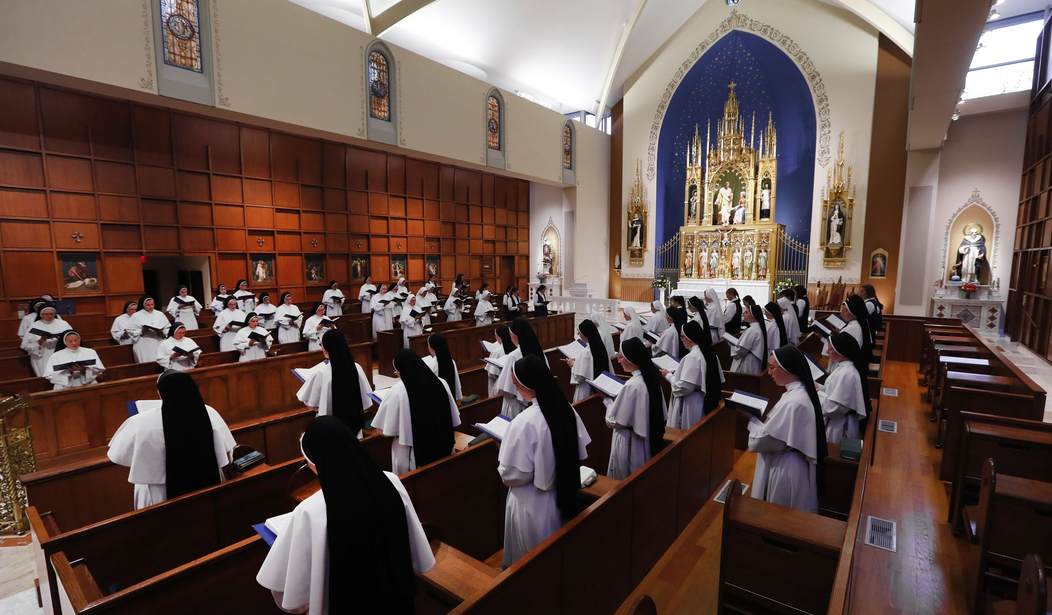"Every Sunday for me it's hard," says Nancy Pelosi in "Being Catholic Now: Prominent Americans Talk About Change in the Church and the Quest for Meaning," a 2008 collection edited by Kerry Kennedy, daughter of the late Robert Kennedy. Pelosi's sabbath difficulty has to do with the Eucharist, the Catholic belief that the bread and wine of Communion are transformed into the literal body and blood of Jesus Christ.
"This is my body, this is my blood. They're asking a lot. In my era, we didn't question any of it," Pelosi says in "Being Catholic."
The Catholic Catechism asserts: "(T)he Eucharist is the sum and summary of our faith: Our way of thinking is attuned to the Eucharist, and the Eucharist in turn confirms our way of thinking." The Catechism sees the Eucharist as "the culmination both of God's action sanctifying the world in Christ and of the worship men offer to Christ and through him to the Father in the Holy Spirit." Seems like an important thing to believe in, no?
This summer, there will be a Eucharistic Congress in Indianapolis. Many religious people are traveling to it by walking hundreds of miles. Years ago, the Magnificat Foundation hosted a Eucharistic procession through Center City, Philadelphia. I was running ahead of it, to take photos for social media. People who encountered it asked questions. One was: "What are they protesting?" I responded by trying to give a Sunday-school lesson. I talked to Father Peter John Cameron, the editor of the Magnificat's monthly publication, about this, and he had the perfect response. "Did you tell them? Sin." Another priest friend of mine, Father Roger Landry, is walking 65 days from New Haven to Indianapolis right now. His deepest heart's desire for his pilgrimage is that it inspires a love of Jesus in others.
Recommended
Pulitzer Prize-winning Wall Street Journal columnist Peggy Noonan spoke this spring in Rome at the North American Pontifical College, home base for seminarians from the United States, among other English-speakers. She was asked to advise them on what people in the pews might need to hear most in their future homilies. The basics, was her answer, delivering her remark with great love for the Church. Don't try to be overly clever. Talk about what Catholics believe, she said.
The spirit of that advice will be present at the Eucharistic gathering in Indianapolis. Given the latest registration numbers I'm aware of, filling the nearly 70,000-capacity of that city's Lucas Oil Stadium might happen. It won't be for politics, during a presidential election year. It won't be for entertainment, in a culture insatiably devouring livestreams and binge-watching series. This is all about God and what that means for us.
It's for discovering, rediscovering and "upgrading" faith, as Father Landry, Columbia University's Catholic chaplain at the Merton Institute and author of "Plan of Life: Habits to Help You Grow Closer to God," puts it. It's about experiencing the awe and mystery of communion, and letting those feelings inspire you to live differently, as a witness of miracles and a faithful believer. It can even be ecumenical. For Christians, may it light a fire for a new Pentecost. For everyone, may it be a reflection and renewal: What do I claim to believe? How do I manifest those beliefs in the world?
I can't participate in the Indianapolis gathering and the pilgrimages leading to it in person, as I had hoped. But one night, early into the pilgrimage, I heard singing flowing in from an open Manhattan window. "Jesus, my Lord, my love, my all. How can I love thee as I ought?" Definitely an improvement on the usual traffic, horns and expletives. And it's a question that could prompt some revolutionary answers for us all.
(Kathryn Jean Lopez is senior fellow at the National Review Institute, editor-at-large of National Review magazine and author of the new book "A Year With the Mystics: Visionary Wisdom for Daily Living." She is also chair of Cardinal Dolan's pro-life commission in New York, and is on the board of the University of Mary. She can be contacted at klopez@nationalreview.com.)

























Join the conversation as a VIP Member